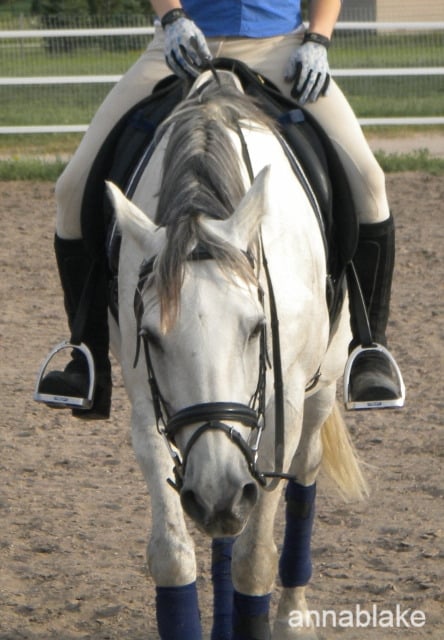 Think of riding as a conversation.
Think of riding as a conversation.
The first challenge is that we don’t all speak English. And it isn’t only the horse I’m referring to. Humans use language, but we define words differently, and sometimes, we may not be perfectly honest, even with ourselves. (I know, hard to believe.) We might say yes when we mean no. Insecurity might create a mood swing between fainthearted and bravado. Which is real?
If it’s a question between words and body language, which do you trust? Exactly, so do horses.
Rule number one: Horses are honest. They give us about what we ask for. So, say what you mean, and mean what you say. If you get an ambiguous answer, listen. Assume it’s an honest response and find a way to ask more clearly.
Riding is a physical conversation, we literally speak with our seats and listen with our bodies. The vast majority of the conversation goes on in the opposite end of the body from our brain and mouth. It isn’t an advantage for us.
One of the most common miscommunications I see riders make is holding a conversation with themselves about their horse, while in the saddle. It’s like talking about your horse behind his back, while he’s in the room. Maybe the rider is indecisively checking her list of aids, or wondering about her position, or over-thinking the exercise. Whatever, the horse is left out of the conversation. Not fair to expect a good response now.
Riding requires awareness and responsiveness on both sides- in present tense. It starts simple: “Walk on.” Then we listen to the horse’s answer: “Now?” If we don’t get the answer we want, stay happy and refine the request: “Forward, yes, thank you, and bigger steps, please.” Listen and respond, then go where the conversation takes you.
“To practice equestrian art is to establish a conversation on a higher level with the horse, a dialogue of courtesy and finesse”. Nuno Oliveira.
Now is where your mother’s training pays off: Say please and thank you. No kidding, it makes a world of difference. Say it with your breath, or with soft hands, or chirp it right out loud. Be generous. You know the experience of a horse being as resistant as you, now train generosity and gratitude.
Sure, you say, that’s all hearts and flowers, but my horse is lazy, bored, hates to work. If your horse is shut down, it means that the conversation lost him. Around the time you thought he went deaf, you probably got loud, insistent, nagging, and frustrated. Sorry, but people with little to say frequently talk the loudest, have you noticed? Shut down is his answer for that, too.
Do you lose your train of thought in the saddle? Do you mumble? Do you shout? Clean it up, enunciate with cheerful clarity. If you want a better conversation from him, evolve your riding vocabulary.
If communication is broken, over-correcting your horse will make it worse. You need find a way to say Good Boy. That’s something you can both agree on. Ask him for something small, like a long walk, or a quiet halt. Set him up to succeed, if he gives you a C-minus answer, reward him like a straight A student. Huge cheer! Instead of getting his attention with a big correction, use a big reward. Attention without fear is a better answer.
Your horse goes from the limbo of not being sure what is right or wrong, to a totally affirmed answer that gives him confidence. Now his behavior tendency is beginning to change from a sullen “Whatever…” to “Yes Ma’am, happy to help!”
Now, energize your conversation skills. Talking about the weather will bore him to bits again soon. Bring up interesting subjects, be that person at the party. Talk transitions and releases, and forward trots that make him feel balanced and strong. Be scintillating, articulate, and the most fascinating rider in the room. Be worth his respect.
Anna Blake, Infinity Farm.
I am going to print this out and put it in a plastic jacket and post it in the barn next to my saddle. Every time I get my horse ready to ride I am going to read this as a reminder! So many times my saddle time is limited so I rush to get ready and I am guilty of rushing my conversations with my horse as well. What a great article and so wonderfully articulated so that even I can understand it!!! 🙂 Thank you for such thought provoking articles!
Elaine
Thanks for reading. It is hard to slow down, I hear that!
This is a great way to explain the connection that is needed with a horse. Love it.
Thanks.
I’d add, if he offers more than you think you asked for, be appreciative of that too and when (not if!) you fall out of balance or make a mistake, apologize. It’ll clear the air.
If he volunteers more than asked for, yay!